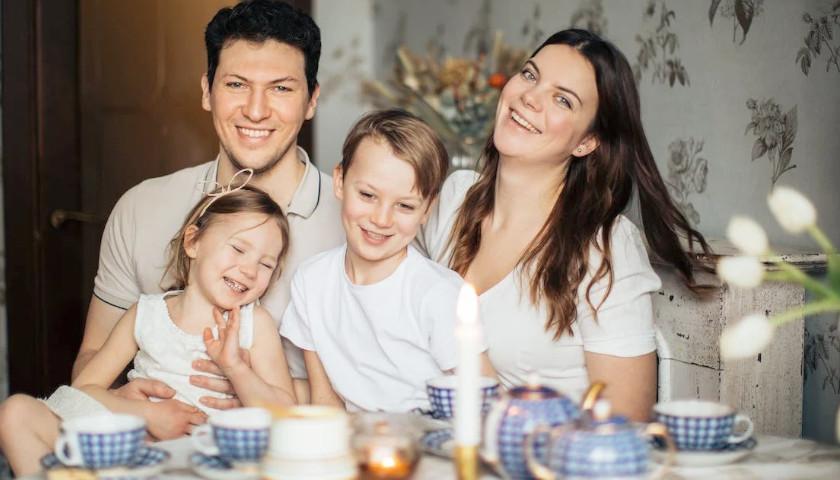by Cadence McManimon
Traditionalism will come to nothing if it is not shared with future generations. You might have children yourself and are in the throes of parenting. Or you might be looking toward a family one day and wondering how best to prepare. How does one go about teaching tradition to children? Where should new and future parents focus in order to give their young ones the same mindset they hold dear?
Most of the answer can be summarized in one simple statement: As parents, we must live by example. We ourselves must live the way we want our children to live. We are the cornerstone of their childhoods, and we have the most influence out of anyone in their young lives. We can use this influence well or neglect it; either way, our children are directly affected. If we develop our own lives to match our values and the traditions we wish to uphold, our children will naturally follow.
Of course, outside of our parental examples, there are thousands of practical decisions to be made about child-rearing. The good news is that parents can pick the most important battles to fight. And there are three big ones we must win.
First, we should give our children siblings. Tradition is rooted in community, and community begins with family. So, we shouldn’t be afraid to add another member (or two or three or five) to the family as time goes on. Our children will not only gain childhood playmates but also a dependable community right in their own home. Even if we are unable to have more children ourselves, we can offer our children similar benefits by connecting with other like-minded families.
Second, we must choose education intentionally. The public school system is not known for promoting tradition—to put it lightly. We should consider the huge amount of time a student spends in school and reflect on whether this giant percentage of childhood is offering our kids the life and morals we want them to have.
I strongly encourage any traditionalist parents to pursue alternative education for their children. Homeschooling is a popular and highly effective option. There are also many parochial schools, online schools, charter schools, and educational co-ops parents can explore. Kids spend about 1,080 hours in a full-time school per year. We should make those hours fit our values.
Third, we need to engage our children in skills, not screens. Technology has brought many benefits to our world, as well as many negative effects. Historically, humanity has survived and even thrived without any of the screens we use daily. Sometimes, traditional living is about what we don’t use, rather than what we do. Daily movies, television, social media, and video games will teach children to be dependent on them for entertainment.
In my experience, the best way to combat this is to replace 90 percent of screen time with something else. Anything else. We can fill this blank space in daily life with traditions and practices we want our children to live out. Popular skills and activities in my circles are
- Going outside
- Reading
- Making music
- Walking
- Gardening
- Raising animals
- Praying
- Handicrafts
- Cooking
- Fitness
- Chores
To prove the benefits of raising children in tradition, I have a real-life example for you: my own upbringing. My parents chose to live a traditional marriage, and I have a host of siblings. My mother homeschooled her children while my father worked. Our screen time was limited, and free time was spent mostly outdoors or pursuing creative hobbies. This lifestyle made space for us to truly practice traditionalism.
Fast forward 20 years, and my siblings and I have reaped the benefits. We are now adults with college educations, good careers, and stable marriages. We all are faithful in our religion and remain extremely close friends with each other.
And our childhood habits have completely directed our life choices even outside of these things! My siblings and I can all do basic carpentry, raise livestock, Irish dance, sew our own clothes, and grow our own food. My physical therapist brother is an accomplished guitarist and won state prizes in baseball. My twin sister pioneered a pediatric oncology nursing position at her workplace. My still-teenage brother uses his homemade forge to create all sorts of metalwork. My sister is an accomplished singer with a talent contract—on top of her work with special needs children. I have published multiple books and pursue classical drawing in my spare time. I could go on about my other siblings, but you get the picture.
These accomplishments are not the result of inborn talent, endless riches, or sheer luck. They are the result of how our parents raised us. As a sibling group, we are not exceptional by nature. We are exceptional because we were taught how to be so. Many of our spouses, friends, and acquaintances have experienced the same thing in childhood and have built equally wonderful, traditionalist lives today.
All of us can do the same thing for our children. After all, the fate of society lies with them.
– – –
Cadence McManimon is a published author, former special education teacher, and now a wife and mother. She has too many houseplants, plenty of artsy projects, and not enough pens that work! (Doesn’t everyone?) Her novels Name Unspoken and The Lily Girl are available at her website cadencemcmanimon.com. Her favorite things include crayons, sarcasm, Sherlock Holmes, and hearing from readers!





